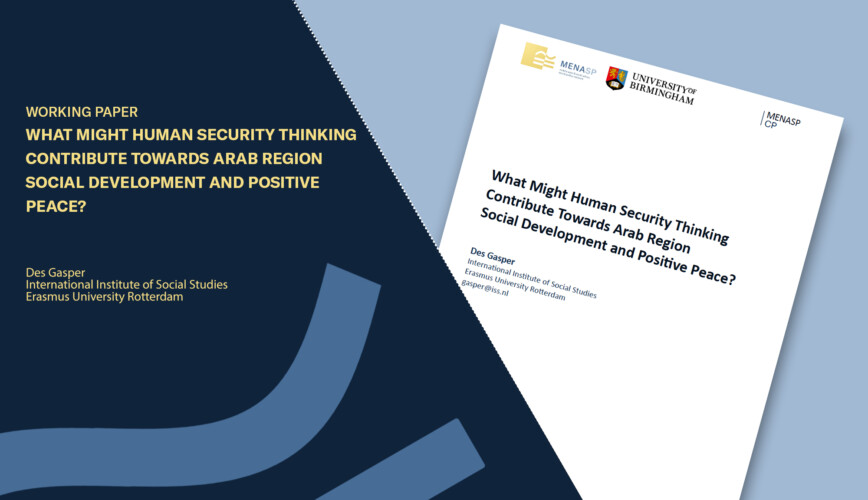This working paper (No. 1) explores claims that the human security approach can contribute to social development analysis, with special reference to the Arab region and understandings of and responses to conflict. It considers ideas in a series of United Nations documents, including the 1994 global Human Development Report (HDR) that articulated a human security perspective, through the 2009 Arab HDR that applied and extended the perspective, to the 2022 UNDP Special Report on Human Security and the 2022 global HDR ‘Uncertain Times, Unsettled Lives’. It asks whether elements of human security thinking add something distinctive to other current international development policy languages, including the SDGs, human development, risk, vulnerability and resilience, citizenship, and social contract. To do this it undertakes an inventory of human security thinking, under four headings: a) human security as concept and objective; b) elements of an analytical framework for understanding (non-)fulfilment of that objective; c) elements of a policy orientation for pursuing the objective; d) particular research and planning tools. It reviews a series of UN-system documents, including also the Arab HDR 2022, and associated literature. The study suggests that human security thinking adds to agendas of social development and peace an umbrella framework for connecting and motivating narrower streams of work, such as on risk, resilience, and social contracts; and also the following: modification of the prioritising language of ‘security’ by a focus on basic needs; a stronger integrating cross-sector focus; greater attention to perceptions and feelings concerning security and insecurity, dignity and indignity, and to the conflict potential of felt indignity; and greater attention to human solidarity, intra-nationally and globally, with emphases on common (shared) security and shared human identity. It proposes that human security thinking can strengthen the diagnostic and motivational content of social development analysis and orient it better towards promoting positive peace.
Keywords – human security; positive peace; social policy; subjective insecurity; solidarity
DOI: 10.48352/uobxmenasp.0001
Author: Des Gasper is professor of Human Development, Development Ethics and Public Policy, at ISS of Erasmus University Rotterdam.
This project is supported by the Middle East and North Africa Social Policy Network (MENASP) at the University of Birmingham, in the framework of its ‘strengthening social welfare and security in the MENA region’ research programme, funded by the UK Arts and Humanities Research Council’s Global Challenges Research Fund.
Disclaimer: The opinions expressed in this publication are those of the authors. They do not purport to reflect the opinions or views of the Middle East and North Africa Social Policy (MENASP) Network or the University of Birmingham.
